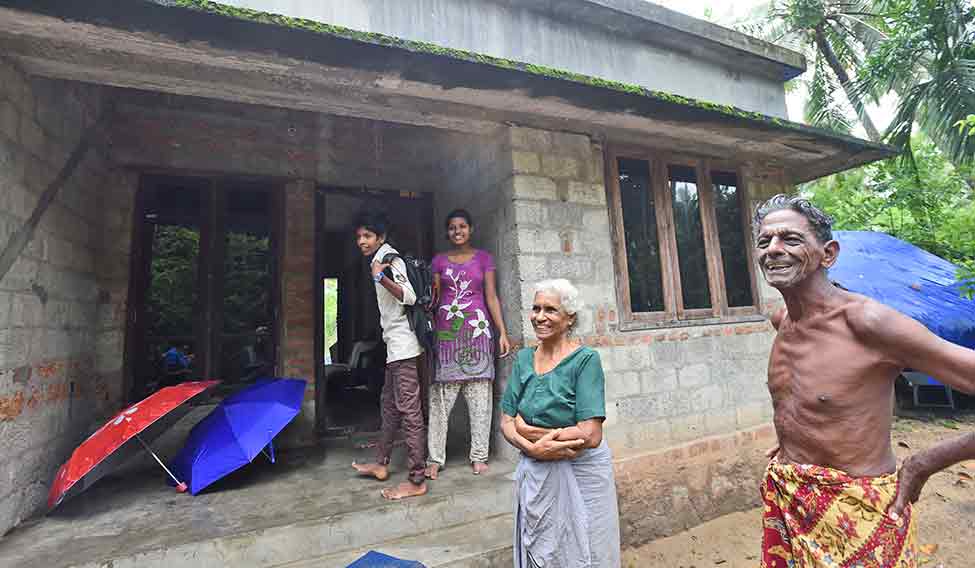There is a scene in the film Chemmeen where Karuthamma, played by the actor Sheela, is listening to a dinner conversation between her mother and father in her home. Her mother is begging her father to return the money he borrowed from a fish merchant to buy a boat. Karuthamma, standing in the corner of the room while her mother is serving rice to her father, is silently willing him to agree. Because for her, it is not just about paying back a debt. It is about keeping a promise she made to her lover, the fish merchant.
I can’t be sure but where I’m standing right then, somewhere between the doorway and the hall of a house on Nattika beach, could be where Karuthamma stood all those years ago shedding silent tears. Things have changed of course. The hut made of mud and palm leaves has become a concrete house. The rich fertile land near the home has turned into a large swathe of water-logged area as fisher families have moved further inland. More than half a century earlier, Chemmeen portrayed the lives of the thriving community. Men and women who lived and loved, told tales about the fury of the sea, dreamed of owning boats and sang about how the “desire of the heart and the attraction of the sea are the same. Both can’t be tamed.” Today, there are only a few broken boats parked on the beach. And many weathered memories.
“During the shooting, the men would go to work during the day and we would stay nearby,” says Madhavi, 76, who lives in the house with her husband, Balakrishnan, 81, and their children. “But during the night, we would come to the house. It would be teeming with members of the crew. Sheela and Sathyan [who played the role of Karuthamma’s husband] would be sitting among the others, sharing jokes and stories. It was different those days. People didn’t mob the sites of film shooting as they do now. Life continued more or less as usual.”
“When the film came out, we were so proud and happy to see our house on TV,” says Balakrishnan.
Based on a novel by Thakazhi Sivasankara Pillai, the film was released on August 19, 1965 and became a blockbuster. The movie tells the tragic story of a Hindu fisherwoman in love with a Muslim fish merchant but forced to marry another fisherman. Chemmeen was the first film from south India to win the Indian president’s gold medal for the best film in 1965. It also won the national award for best film that year. It was screened both at Cannes and Chicago film festivals. In Chicago, it won a Certificate of Merit, the first Malayalam film to be recognised at an international festival.
As memorable as the film’s story was the cinematography by Marcus Bartley and U. Rajagopal and music by Salil Chowdhury. His song Maanasa Maine Varu, rendered by Manna Dey, remains evergreen in the memories of the fishermen here. “Sathyan and Madhu [who plays the fish merchant] looked exactly as they did in the movie but Sheela was much more beautiful in person,” says Gopalan, 75, another fisherman from the area. “They put on a lot of makeup and darkened her skin to make her look more like a fisherwoman.”
Life has changed a lot for the fishermen at Nattika today. “Those days, education was not important to us,” says Gopalan. “I don’t even remember playing games with other children. As soon as we grew of age, we followed our fathers into the sea. We would wake up around 4am in the morning and go to sea. No one could predict when we would get back. It was a lifestyle particular to the fishermen then.”
A fisherman called Balu, 61, tells me that after the fishing season ends in August, there is nothing for the fishermen to do. “The government doesn’t even let us play cards even though we’ve been doing it for years,” he says. “Those who can have left this seashore to go to Gulf countries to make money. But the peculiar thing about the rest of us is that we’ll never leave here or change our professions, no matter how dire our situation.”
Perhaps the changes in these fishermen’s lives are only cosmetic. Their passions and beliefs stay the same. Chemmeen explores many themes like loneliness, unrequited love, jealousy and greed. The sea is almost a character in the film and, in many ways, the most important one because even today, these fishermen believe in a benign sea goddess who will protect them and give them fair warning before unleashing her fury upon them. “The sea goddess means more to us than our birth mothers,” says P.V. Janardhanan, 58, a fish trader from Nattika. “Perhaps because it is so dangerous out there, our dependence on a higher power increases. Why do you think we have so many temples in this region? No fisherman will go out to sea without touching the sand and murmuring a small prayer.”
And in the end, they believe the sea will take them to its shimmering depths where there will no longer be any cares or worries. In the poignant scene where Palani, played by Sathyan, fights with the shark in the swirling waters of the sea, his last words are addressed to the shark: “Are you taking me to the palace of the sea goddess?”






